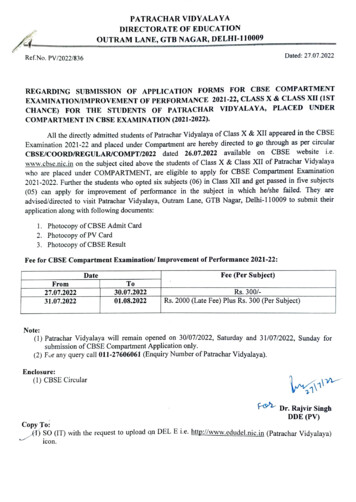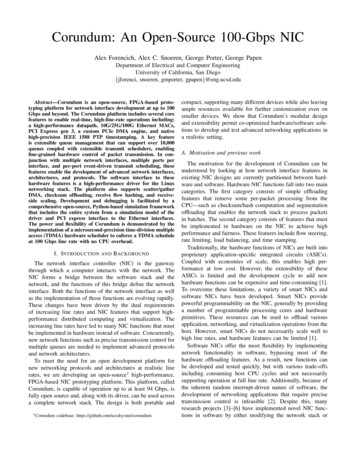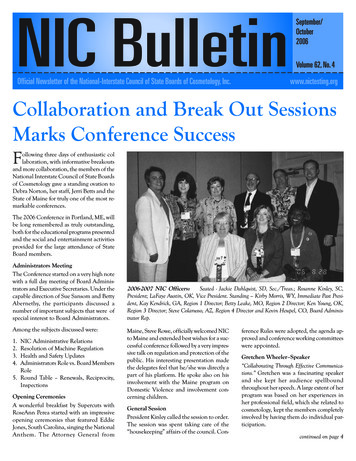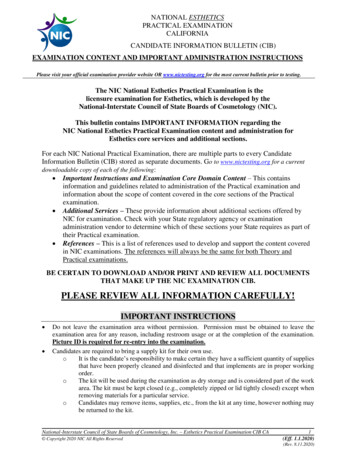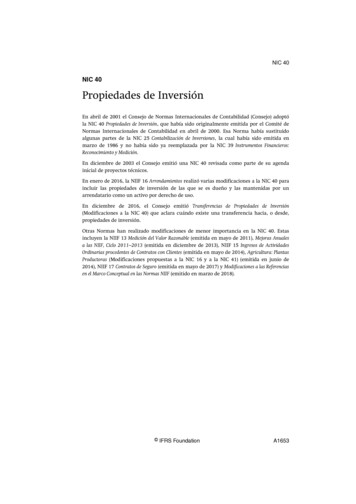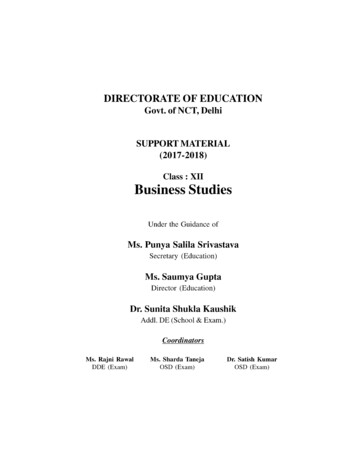
Transcription
Coordinators
.
.
LIST OF MEMBERS WHO REVIEWED THESUPPORT MATERIAL FORBUSINESS STUDIES OF CLASS-XII2017-2018CLASS XIIGROUP LEADER1.Ms. Poonam KhannaGGSS, Azadpur VillageVice principal(Team Leader)2.Ms. Rajinder KaurSKV, GTB Nagar(Lecturer Commerce)3.Ms. ReenaGGSSS, No-2, Narela(Lecturer Commerce)4.5.Ms. Anu NandaS.K.V No.-1(Lecturer Commerce)Model TownMs. Vinita DuttGGSSS, Adarsh Nagar(Lecturer Commerce)
BUSINESS STUDIESCLASS XIISYLLABUSCourse StructureUnitsMarksPART A:Principles and Functions of Management1.2.Nature and Significance of Management Principles of Management 3.Business Environment 4.Planning5.6.7.8.1614 Organising Staffing Directing Controlling 20PART B: Business Finance and Marketing9.10.11.12. Financial Markets Marketing Management Consumer Protection Financial Management1515PART C: Project Work20Total1002Class XII : Business Studies
QUESTION PAPERPAPER DESIGNDESIGN YEARYEAR 2017-182016-17BUSINESS STUDIESCode No. 054Class XII80Max. Marks : 90Time: 3 HoursVeryShortAnswer(1 e(3 Marks)(4 Marks)(5 Marks)(6 Marks)21112Understanding(Comprehension- to be familiar with meaningand to understand conceptually,interpret, compare, contrast,explain, paraphrase, or interpretinformation)2213Application-(Use abstractinformation in concrete situation,to apply knowledge to newsituations, Use given content tointerpret a situation, provide anexample, or solve a problem)214High Order Thinking Skills (Analysis & Synthesis - Classify,compare, contrast, ordifferentiate between differentpieces of information, Organizeand/or integrate unique piecesof information from a variety ofsources)215Evaluation-(Appraise, judge,and/or justify the value or worthof a decision or outcome, or topredict outcomes based onvalues)-S.Typology of QuestionsNo.1Remembering-(Knowledgebased Simple recall questions,to know specific facts, terms,concepts, principles, or theories,Identify, define, or recite,information)LearningOutcomes 2025%2—11924%1 (valuesbased)1-911%100% Reasoning AnalyticalSkills CriticalSkillsTOTAL - 1 Project(20 marks) 208 1 85 3 156 4 243 5 153 6 1880 (25)Project(20)Estimated Time (in minutes)8 min20 min50 min37 min50 min165 min 15 min.for revisionClass XII : Business Studies3
CHAPTER 1NATURE AND SIGNIFICANCEOF MANAGEMENTManagement is an art of getting things done with and through others. Managementcan be defined as, the process of getting things done with the aim of achievingorganizational goals effectively and efficiently.Basis of DifferenceEffectiveness1. MeaningIt refers to completingIt refers to completingthe job on time, no matter the job in the costwhatever the cost.effective manner.2. ObjectiveTo achieve end resulton time.To conduct cost-benefitanalysis.3. Main ConsiderationTimeCostQ.1EfficiencyRama Clothes ltd.’s target is to produce 20,000 shirts per month at a costof Rs.500/- per shirt. The production manager achieved this target at acost of Rs.450/- per shirt. Do you think the manager is effective andefficient?Ans. Yes, he completed the work on time and at a lower cost.Characteristics of Management:1.Goal oriented Process:It is a goal oriented process, which is undertakento achieve already specified and desired objectives by proper utilization ofavailable resources.2.Pervasive: Management is universal in nature. It is used in all types oforganisations whether economic, social or political irrespective of its size,nature and location and at every level.4Class XII : Business Studies
3.Multidimensional:It is multidimensional as it involves managementof work,people and operations. Every organisation is established for doing somework like school provides education, a factory produces etc. The managementhas to ensure the participation, of its people in the realisation of theorganisation goal. Also management needs to conduct the various operationssuch as production, sale, purchase etc.4.Continuous:Management is not a process which can be performed onceand for all, but it is a continuous process. Functions of management likeplanning, organising, staffing, directing and controlling continuously need tobe done.5.Group Activity: It is a group activity since it involves managing andcoordinating activities of different people as a team to attain the desiredobjectives.6.Dynamic function:It is a dynamic function since it has to adapt accordingto need, time and situation of the changing environment in order to besuccessful, an organisation must change itself and its goals. For example,McDonalds made major changes in its ‘Menu’ to survive in the Indian market.7.Intangible Force:Management is such a force that cannot be seen, only itspresence can be felt. When the goals of an organisation are being realisedin accordance with its plans, we can say that the management of theorganisation is good.Q.2 An educational institution as well as a business organization both need tobe managed. Which characteristic of management is highlighted here?(Pervasive)Q.3 “In an organization, the employees are happy and satisfied, there is nochaos and the effect of management is noticeable.” Which characteristicof management is highlighted by this statement? (Intangible Force)Q.4 In order to be successful an organisation must change its goals accordingto the needs of environment. Which characteristic of management ishighlighted here? (Dynamic)Class XII : Business Studies5
Q.5 Management is multi-dimensional. Give any 2 dimensions of it. (Work,People and operations (any two)Objectives of ManagementA.Organizational objectives: It refers to the utilisation of human and physicalresources available in the organisation, considering the interest of allstakeholders.1.Survival – Management of an organisation must ensure the survival ofthe organisation by earning enough revenues to cover costs.2.Profit – It plays an important role in facing business risks and successfulrunning of business activities.3.Growth – Management must ensure growth which can be measuredby increase in sales of product, number of employees or increase incapital investment etc.B.Social objectives: It refers to the consideration of the interest of the societyduring managerial activities. For e.g. - to save environment from gettingpolluted etc.C.Personal objectives: It refers to the objectives to be determined with respectto the employees of the organisation.Q.6One of the objectives of management is to consistently create economic valuefor various constituents of the society. Give two examples of this objective.Ans. Social objectives of management.(i)Using environment friendly method of production.(ii) Giving employment opportunities to disadvantaged sections of thesociety.Q.7. Sana Ltd. is a company producing Fans.The company’s profits are enoughfor the survival and growth. The management of the company believes thata satisfied employee creates a satisfied customer, who in turn creates profitsthat lead to satisfied shareholders. So, it pays competitive salaries andperks to all its employees. All the employees are happy working in theorganisation because of personal growth and development.6Class XII : Business Studies
The company has a strong sense of social responsibility. It has set up anEngineering College in which one-third of the students are girls to whomthe company gives 50% scholarship.Is the management of Sana Ltd. fulfilling its objectives? Justify your answerby giving reasons.Ans. Yes, the management of Sana Ltd. is fulfilling all the objectivesorganisational objectives, social objectives and personal objectives(For reasons students can quote the lines).Importance of Management1.Achieving Group Goals:Management creates team work and coordinationin the group. Managers give common direction to individual efforts inachieving the overall goals of the organization.2.Increases Efficiency:Management increases efficiency by using resourcesin the best possible manner to reduce cost and increase productivity.3.Creates Dynamic organization:Management helps the employeesovercome their resistance to change and adapt as per changing situation toensure its survival and growth.4.Achieving personal objectives:Management helps the individuals achievetheir personal goals while working towards organisational objectives.5.Development of Society:Management helps in the development of societyby producing good quality products, creating employment opportunities andadopting new technology.Management as an ArtArt refers to skilful and personal application of existing knowledge to achieve desiredresults. It can be acquired through study, observation and experience. The featuresof art as follows:1.Existence of theoretical knowledge: In every art, systematic and organizedstudy material should be available compulsorily to acquire theoreticalknowledge.Class XII : Business Studies7
2.Personalised application:The use of basic knowledge differs from personto person and thus, art is a very personalised concept.3.Based on practice and creativity: Art involves the creative practice ofexisting theoretical knowledge.In management also a huge volume of literature and books are available ondifferent aspects of management. Every manager has his own unique styleof managing things and people. He uses his creativity in applyingmanagement techniques and his skills improve with regular application. Sinceall the features of art are present in management so it can be called an Art.Management as a ScienceScience is a systematised body of knowledge that is based on general truths whichcan be tested anywhereand anytime. The features of Science are as follows:1.Systematized body of knowledge:Science has a systematized body ofknowledge based on principles and experiments.2.Principles based on experiments and observation:Scientific principlesare developed through experiments and observation.3.Universal validity:Scientific principles have universal validity and application.Management has systematic body of knowledge and its principles aredeveloped over a period of time based on repeated experiments &observations which are universally applicable but they have to be modifiedaccording to given situation.Conclusion: -As the principles of management are not as exact as the principlesof pure science, so it may be called-an inexact science. The prominence of humanfactor in the management makes it a Social Science.Management as ProfessionProfession means an occupation for which specialized knowledge and skills arerequired and entry is restricted. The main features of profession are as follows:1.Well-defined body of Knowledge:All the professions are based on welldefined body of knowledge.8Class XII : Business Studies
2.Restricted Entry:The entry in every profession is restricted throughexamination or through some minimum educational qualification.3.Professional Associations:All professions are affiliated to a professionalassociation which regulates entry and frames code of conduct relating tothe profession.4.Ethical Code of Conduct:All professions are bound by a code of conductwhich guides the behaviour of its members.5.Service Motive:The main aim of a profession is to serve its clients.Conclusion:-Management does not fulfil all the features of a profession and thusit is not a full-fledged profession because anybody can proclaim to be a manager;prescribed compulsory educational degree or license is not required. Besides thereare not any formal ethical codes which are required to be observed.Q.8Give one feature of Profession (a) satisfied by management (b) not satisfiedby the management.Ans. (a) Well defined body of knowledge.(b) Restricted entryLevels of Management: Top, Middle and Operational Levels“Levels of management” means different categories of managers, the lowest tothe highest on the basis of their relative responsibilities, authority and status.Class XII : Business Studies9
Top LevelConsists of Chairperson, Chief Executive Officer, Chief Operating Officer orequivalent and their team.Chief task is to integrate and to coordinate the various activities of the business,framing policies, formulating organisational goals & strategies bearing theresponsibility for the impact of activities of the business on society.Middle LevelConsists of Divisional or Departmental heads, Plant Superintendents and OperationManagers etc.Main tasks are to interpret the policies of the top management, to ensure theavailability of resources to implement policies, to coordinate all activities, ensureavailability of necessary personnel & assign duties and responsibilities to them.Lower Level/Supervisory LevelConsists of Foremen and Supervisor etc.Main task is to ensure actual implementation of the policies as per directions, bringworkers’ grievances before the management & maintain discipline among theworkers, maintain the quality of output and minimise wastageQ.9 At which level of management, are the managers responsible for the welfareand survival of the organization? (Top level)Q.10 Managers at the top level spend more time doing this function ofManagement. Name it. (Determine policies)Q.11 Rakesh is working as Regional Manager in ABC Ltd. Name the level atwhich he is working. (Middle Level)Q.12 Name the level at which the managers are responsible for implementingand controlling the plans and maintaining the quality of output (Supervisorylevel).Functions of Management / Elements of Management(1)Planning is deciding in advance what to do in future and how to do it.10Class XII : Business Studies
(2)Organising is to assign duties, grouping tasks, establishing authority andallocating resources required to carry out a specific plan.(3)Staffing is finding the right people for the right job by following a series ofsteps and includes training and development.(4)Directing is leading, influencing and motivating employees to perform thetasks assigned to them. It includes four activities: - Supervision,Communication, Leadership and Motivation.(5)Controlling is monitoring the organizational performance towards theattainment of the organizational goals.Q.13 Identify the functions of the management: —a)Motivating employees and giving instructions to them to perform thetasks assigned to them.b)Recruitment and selection of the personnel.c)Finding out deficiencies in implementation of plans.d)Preparing a blueprint for futuree)Process of defining and grouping activity of an enterprise to establishauthority relationship.Ans. (a) Directing; (b) Staffing; (c) Controlling (d) Planning (e) Organising.Co-ordinationCoordination is to synchronise the various activities of an organisation. In the contextof business unit, the meaning of coordination is to balance its various activities(purchase, sales, production, finance, personnel etc.) so that objective of businesscan be easily achieved.Lack of coordination results in overlapping, duplication, delay and chaos.Characteristics of Coordination1.Coordination integrates group efforts: It integrates diverse businessactivities into purposeful group activity ensuring that all people work in onedirection to achieve organizational goals.Class XII : Business Studies11
2.Coordination ensures unity of action: It directs the activities of differentdepartments and employees towards achievement of common goals andbrings unity in individual efforts.3.Coordination is a continuous process: It is not a specific activity matter,it is required at all levels, in all departments till the organization continues itsoperations.4.Coordination is all pervasive function: It is universal in nature. Itsynchronizes the activities of all levels and departments as they areinterdependent to maintain organizational balance.5.Coordination is the responsibility of all managers: It is equally importantat all the Three-Top, Middle and Lower levels of management. Thus it is theresponsibility of all managers that they make efforts to establish coordination.6.Coordination is a deliberate function: Coordination is never establishedby itself rather it is a conscious effort on the part of every manager.Cooperation is voluntary effort of employees to help one another. Effectivecoordination cannot be achieved without cooperation of group members.Coordination is the Essence of Management.Coordination is not a separate function of management. It is the force that binds allthe functions & thus, called the essence of management.It is needed in all management functions:Planning – Coordination between the master plan and departmental plan.Organising – required between authority, responsibility and accountabilityStaffing – Achieve balance between job requirement and qualities of personnelDirecting – Required between supervision, motivation and leadership.Controlling – Ensure actual result conform to expected results.Needed at all levels of managementTop level – needs coordination to integrate activities of the organisation foraccomplishing the organisational goals.12Class XII : Business Studies
Middle level– Coordination of the efforts of different sections and sub-sectionsLower level – Coordination in the activities of workers to ensure work progressesas per plansNEED FOR COORDINATIONThe reasons that bring out the importance or the necessity for coordination are: Growth in the size of the organisation results in the increase in varied qualityof manpower too with varied individual aspirations. Coordination seeks tomatch the individual goals with the organisational goals. Functional Differentiation arising out of departmentalisation and divisionbrings forth a motive for achievement of individualobjectives, in isolationfrom other objectives leading to departmental clashes. Coordination seeksto iron out these variations. Specialisation can give rise to feeling of superiority and prioritising of theirzone or activities. Coordination seeks to sequence and integrate all thespecialist of activities into a wholesome effort.Q.14 Name the process that synchronises the activities of differentdepartments.(Coordination)Q.15 “Co-ordination is responsibility of all the managers”. Explain. (Managersperform it all levels to ensure that work proceed according to plans).Class XII : Business Studies13
QUESTIONS FOR PRACTICEQ.1“Planning, Organising, Staffing, Directing and Controlling” is the sequenceof functions in a process. Name it. (Management)(1)Q.2Production Manager of Kavya Ltd. tries to produce goods with minimumcost. Name the concept which is being focussed by management. (Efficiency)(1)Q.3In order to be successful, an organization must change it according to theneeds of the environment which characteristic of management is highlightedin the statement? (Dynamic)(1)Q.4Which force binds all other functions of management? (Coordination)Q.5Radhika Ltd. uses environment friendly methods of production. Identify theobjective it is trying to achieve. (social objectives)(1)Q.6Your uncle is serving as a foreman in a factory. At what level of managementis he working? (Lower Level)(1)Q.7Why is it said that “management is a goal oriented process”? (Because ithelps in achieving organisational goals by unity of efforts.(1)Q.8Identify the nature of management when it is practiced as personalisedapplication of existing knowledge to achieve desired results. (Managementis an art)(1)Q.9“Success of an organisation largely depends upon its management” Explainany five reasons to fortify the above statement. (Any five points of importance)(1)(1)Q.10 The General manager- GM of ‘RadhaswamiKidswear Limited’, Mr.SahilRadhaswami, has divided all the employees of his company into threelevels (Top Level, Middle level and Lower Level) different individuals. At theTop Level the General Manager and Board of Directors themselves work.The Middle Level work is looked after by the four Departmental managerslike the Production Manager, Purchase manager, Sales Manager andFinance Manager.14Class XII : Business Studies
The Lower Level is constituted of one supervisor of each of the fourdepartments. These Supervisors look after the daily activities of theirsubordinates. They also maintained the flow of inputs in the productionprocess to transform it to desired output.Often, it is observed that the managers of all Levels remain busy sometimeswith the planning of their respective departments and sometimes with thecomparison of the desired and actual results. Similarly, sometimes they arebusy with the Recruitment, Selection and Training of the employees andsometimes with their motivation.Mr. Sahil knows it very well that the job of management cannot be done by asingle person alone, but when all join hands to work together the meaningof management is realised. This is why he makes all his efforts to effectcoordination in the activities of all his employees. All the employees areworking with the team spirit.In the above paragraph features of management have been described.Identify them by quoting the relevant lines and explain them.((i) Continuous process (ii) Group activities (iii) pervasive (iv) Intangible force(v) Multi-dimensional.(5)Class XII : Business Studies15
CHAPTER - 2PRINCIPLES OF MANAGEMENTConcept of Principles of ManagementPrinciples of Management are the broad and general guidelines for managerialdecision making, behaviour and action.The management principles are derived from observation, analysis, experimentalstudies and personal experiences of the managers.Nature of Principles of ManagementThe nature of principles of management can be described in the following points:1.Universal applicability i.e. they can be applied in all types of organizations,business as well as non-business, small as well as large enterprises.2.General Guidelines:They are general guidelines to action and decisionmaking however they do not provide readymade solutions as the businessenvironment is ever changing or dynamic.3.Formed by practice and experimentation:They are developed afterthorough research work on the basis of experiences of managers.4.Flexible: They can be adapted and modified by the practicing managers asper the demands of the situations as they are manmade principles.5.Mainly Behavioural:Since the principles aim at influencing complex humanbehaviour they are behavioural in nature.6.Cause and Effect relationship:They intend to establish cause & effectrelationship so that they can be used in similar situations.7.Contingent:Their applicability depends upon the prevailing situation at aparticular point of time. According to Terry, “Management principles are‘capsules’ of selected management wisdom to be used carefully anddiscretely”.16Class XII : Business Studies
Significance of the Principles of ManagementThe significance of principles of management can be derived from their utility whichcan be understood from the following points:1.Providing managers with useful insights into reality:Managementprinciples guide managers to take right decision at right time by improvingtheir knowledge, ability and understanding of various managerial situationsand circumstances.2.Optimum utilization of resources and effective administration:Management principles facilitate optimum use of resources by coordinatingthe physical, financial and human resources. They also help in betteradministration by discouraging personal prejudices and adopting an objectiveapproach.3.Scientific decisions: Decisions based on management principles tend tobe more realistic, balanced and free from personal bias.4.Meeting the changing environmental requirements: Managementprinciples provide an effective and dynamic leadership and help theorganization to implement the changes.5.Fulfilling social responsibility: Principles of management not only help inachieving organizational goals but also guide managers in performing socialresponsibilities. Example: “Equity” and “Fair” remuneration.6.Management training, education and research: Management principlesare helpful in identifying the areas in which existing and future managersshould be trained. They also provide the basis for future research.Q.1How are management principles derived? (Formed by practice andexperimentation)Q.2“The principles of management are different from principles of science”.How? (Principles of management are flexible but principles of science arerigid).Q.3Give reasons, why principles of management are not rigid prescriptions?(Hint: As they are directly concerned with human behaviour which is alwaysuncertain)Class XII : Business Studies17
Q.4Q.5How are Principles of management helpful for managers in fulfilling theirsocial responsibility? (By interpreting principles in their newer andcontemporary meaning with change in time)What is the role of principles of management for managers? (They serveas guide to decision making).Fayol’s Principles of ManagementAbout Henry Fayol: Henry Fayol (1841-1925) got degree in Mining Engineeringand joined French Mining Company in 1860 as an Engineer. He rose to the positionof Managing Director in 1988. When the company was on the verge of bankruptcy.He accepted the challenge and by using rich and broad administrative experience,he turned the fortune of the company. For his contributions, he is well known as the“Father of General Management”.Principles of Management developed by Fayol1.Division of work: Work is divided in small tasks/job and each work is doneby a trained specialist which leads to greater efficiency, specialisation,increased productivity and reduction of unnecessary wastage andmovements.2.Authority and Responsibility: Authority means power to take decisionsand responsibility means obligation to complete the job assigned on time.Authority and responsibility should go hand in hand. Mere responsibilitywithout authority, makes an executive less interested in discharging his duties.Similarly giving authority without assigning responsibility makes him arrogantand there is fear of misuse of power.3.Discipline: It is the obedience to organizational rules by the subordinates.Discipline requires good supervisors at all levels, clear and fair agreementsand judicious application of penalties.4.Unity of Command: It implies that every worker should receive orders andinstructions from one superior only, otherwise it will create confusion, conflict,disturbance and overlapping of activities.S u pe rio rSu p eri or 1S up er ior 2SuSbou perd rioin aterS u pe rio r 3upoerrdiiorna2teSSubU n it y o f C o mm a n dM u lt ip licit y o f C o mm a n d18Class XII : Business Studies
Q.65.The production manager of Bharat Ltd., instructs a salesman to go slow inselling the products whereas the marketing manager is insisting on fastselling to achieve the target. Which principle of management is beingviolated in this case. Write one of the consequences of violation of thisprinciple. (Unity of command, Reduces the efficiency)Unity of Direction: Each group of activities having the same objective musthave one head and one plan. This ensures unity of action and coordination.Difference between Unity of Command and Unity of DirectionB a s is(1 ) M e a n in g(2 ) A im(3 ) Im p lica tio n sU n ity o f C o m m a n dU ni ty o f D ire c tio nO n e s u b o rd in a te sh o u ldre c e iv e o rd e rsfro m & sh o u ld b ere s p o n s ib le to o n lyo n e su p e rio r.P re ve n ts d u a l s u b o rd in a tio n .E a c h g ro u p o fa ct ivitie sh a vin g s a m eo b je ctive , m u sth a ve o n e h e a d .P re v e n tso v e rla p p in g o fa c tiv itie s.A ffe c ts a n in d ivid u a le m p lo ye e .A f fe cts th e e n tireo rg a n iza tio n .6Subordination of Individual Interest to General Interest: The interest ofan organization should take priority over the interest of any one individualemployee.7.Remuneration of Employees: Remuneration of employees should be justand equitable so as to give maximum satisfaction to both the employeesand organisation.The employees should be paid fair wages/salaries which would give at leasta reasonable standard of living. At the same time, it should be within thepaying capacity of the company8.Centralisation and Decentralisation: Centralisation means concentrationof decisions making authority in few hands at top level. Decentralisationmeans evenly distribution of power at every level of management. Both shouldClass XII : Business Studies19
be balanced as no organization can be completely centralised or completelydecentralised.9.Scalar Chain: The formal lines of authority between superiors andsubordinates from the highest to the lowest ranks is known as scalar chain.This chain should not be violated but in emergency employees at samelevel can contact through Gang Plank by informing their immediate superiors.ABECFDGGang Plank10.Order:According to the principle of order, a right person should be placed atthe right job and a right material should be placed at the right place. Accordingto Fayol, every enterprise should have two different orders – material orderfor physical resources and social order for human resources.11.Equity:The working environment of any organization should be free from allforms of discrimination (religion, language, caste, gender, belief or nationality)and principles of justice and fair play should be followed. No worker shouldbe unduly favoured or punished.12.Stability of Personnel:According to this principle, employees once selected,should be kept at their post/position for a minimum fixed tenure. They shouldbe given reasonable time to show results.13.Initiative:Workers should be encouraged to develop and carry out their planfor improvements. Initiative means taking the first step with self-motivation.It is thinking out and executing the plan.14.Espirit De Corps:Management should promote team spirit, unity andharm ony am ong employees. T his encourag es m utual trust andbelongingness, which results in minimum need for using penalties.20Class XII : Business Studies
Q.7Rakesh and Rahim are employed in the same company. They are workingat same position and pe
list of members who reviewed the support ma terial for business studies of class-xii 2017-2018 class xii group leader 1. ms. poonam khanna ggss, azadpur village


